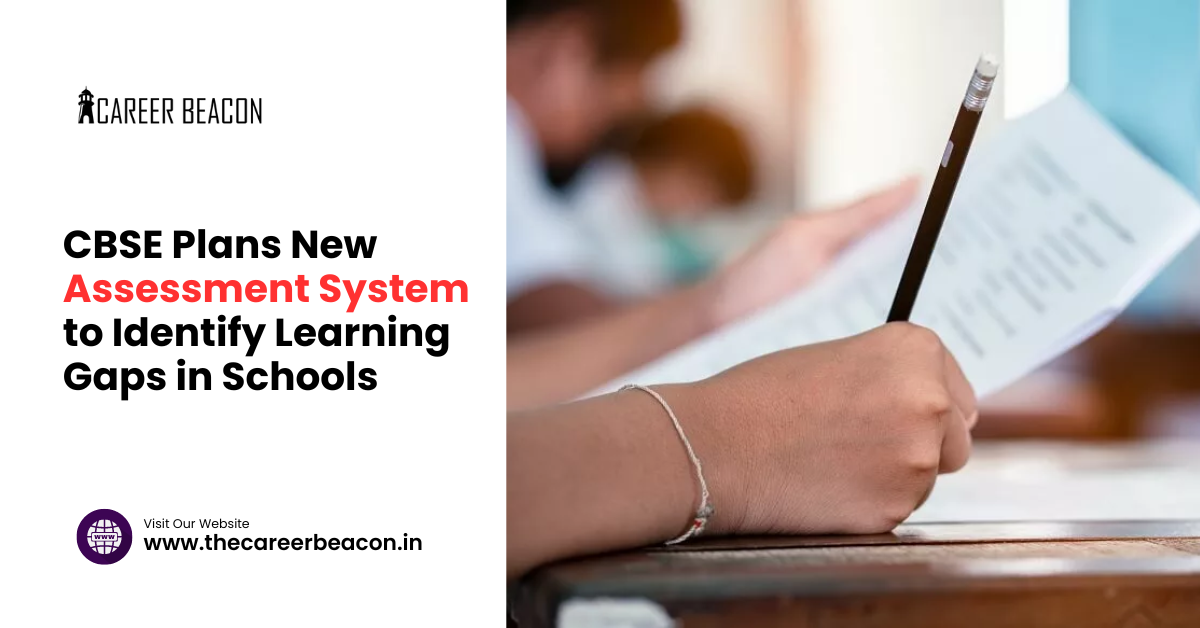
CBSE plans new assessment system to identify learning gaps in schools
In its bid towards transformation of education, the Central Board of Secondary Education (CBSE) has said that it will soon embark on developing a new assessment model with the intention of The process is to identify areas of difficulty that students encounter at the school level. It is one of the many strategies for enhancing learners’s performance and placing them in a better standing to handle eventualities in their future careers. In this way, the identified gaps help align the education system with the career growth courses, thereby directing the students on the best way forward.
This new system therefore is a grand plus for educators, students, and education carer ecoach as they seek to lay down a good foundation. The consequences of this trend also do not end at the arena of academic results; they have invaded the area of career management; thus, students must strive towards achieving short-term objectives related to learning as well as planning for their long-term future careers.
The above analysis reveals that there is a need for a new assessment system in the teaching and learning process of students.
Globalisation has created an ever-changing job market that requires an education system that not only educates students but also prepares them for the challenges in the real world. The traditional forms of instruction therefore limit diverse learning assessment methods to give an accurate evaluation of the student and therefore hamper the growth of a student in careers. The CBSE’s new assessment system addresses this issue by focussing on:
Being able to detect at the early stage that a particular student is not learning, hence avoiding aggravation of the situation.
- Developing lesson maps that cater for individual abilities and achievements of the learners.
- They also involve reinforcing constancy by inspiring constant assessment and improvement.
- This shift towards a more multifaceted and robust method of evaluation can be considered as CBSE’s effort to bring contemporary changes to the education system and to equip students not only for exams but for their future professions.
Essentials of the New System of Assessment
CBSE’s new system of assessment and examination will include not only knowledge and facts but ways in which a learner can use this knowledge in different contexts. Here are the key features of this revamped assessment system:
Competency-Based Learning: This has intentions of applying critical thinking and problem solving rather than memorising knowledge for use in examinations. Competencies of such nature are highly sought in the current employment landscape and are also very helpful in the advancement of any career.
- Data-Driven Insights: Facilities and teachers who are handling the students will be able to see an analysis containing information about the student’s performance. This will also create a basis on which interventions can be made and assist the students in preparing for certain career growth courses that best suit them.
- Periodic Evaluations: This system will entail much more than the annual checkups that the previous system employed. This enables the teachers to monitor the progress of learning in real time and may decide to alter a few strategies that they have used in teaching.
- Career Counselling Integration: These assessments may be of benefit to education career coach to advise the students on more appropriate careers to consider. It means that the strengths that are revealed already at this age should inform the coaches of the programs for courses and extracurricular activities that would prepare the student for his or her future career.
How This Affects Students’s Career Advancement
This new assessment system has as one of its purposes to reduce or eliminate the gap between education and the workplace. In this changing system of education, the student will be able to access many opportunities for pursuing their interests and skills for self-development, in addition to being able to tap on to the career advancement courses identified to give the students exposure to diverse fields of professional career.
Benefits for Students:
- Early Identification of Interests: With this insight, students can, for instance, drop subjects they are not good at in areas they have no interest in but take subjects they have interest in and do well.
- Tailored Learning Plans: In accordance with given assessments, one can come up with individual learning activities that will help prepare the students for competitive examinations as well as career advancements.
- Enhanced Skill Development: Competency-based learning makes sure that a student is trained in areas that are relevant to the workplace, which include critical thinking and interpersonal communication skills, among others.
Mitigating learning deficits in this vein will make it easy for learners to select the right ‘education career’ coach that will assist in selecting an appropriate course to follow based on their strengths and interests.
Education Career Coach in This New Era
This new system of assessment therefore opens a great prospect for education career coaching to take on a much more robust part of influencing students’ destiny. These coaches are going to play a significant role in explaining to the students the results of their assessment as well as the strategies applicable for long-term career success. Regardless of a student’s occupation of interest (doctor, engineer, artist, scientist), an education career specialist can offer tremendous help.
Ways Career Coaches Can Help
- Interpreting Assessment Data: Coaches being able to look at the new assessments and be able to have detailed information for the students to be able to have learning and/or career path plans.
- Recommending Career Growth Courses: Therefore, identifying the strengths or the areas of weakness in a student’s performance, career coaches will recommend enabling courses that foster personal development and career advancement.
- Building Confidence: Every child, especially the ones in school, would probably agree that moving to the next level of their professional lives can be a challenge. Career coaches are useful in increasing the students’ self-esteem by giving them practical guidance and a career plan.
Effect on Educators and Schools
It will also entail a change in schools and the educators to embrace new ways of facilitating and assessing student learning. This way, through information on the assessments, the teachers will help the students to be on track for their learning to enable them to achieve in their studies as well as to be fit for employment after completing their academic journeys.
Key Changes for Educators
- Shifting Focus to Competency-Based Learning: Teachers will have to depart from the more conventional methods of teaching that entail memorisation and must start imparting skills that are relevant to the jobs of today.
- Collaboration with Career Coaches: It is therefore crucial that educators and career coaches collaborate so as to help students achieve their potential in school and other growth courses in their respective careers.
- Continuous Professional Development: In order to be able to perform in this new assessment system, the educators may have to train in data analysis and, moreover, teach using new trends.
Conclusion: Bright Career Growth in the Future
CBSE’s new system of assessment has also brought a revolutionary change in the process and method of evaluation of students and the preparation of students for employment or entrepreneurship opportunities in the future. When the learning needs are uncovered, it becomes easier to ensure that students do not have to struggle with the issues that may affect their ability to fit into the current workplace. Career advancement classes and education career mentors will hence take an active role in guiding the students towards this new era and equipping the students with the fundamentals of succeeding not only in the classroom but in the work area as well.


